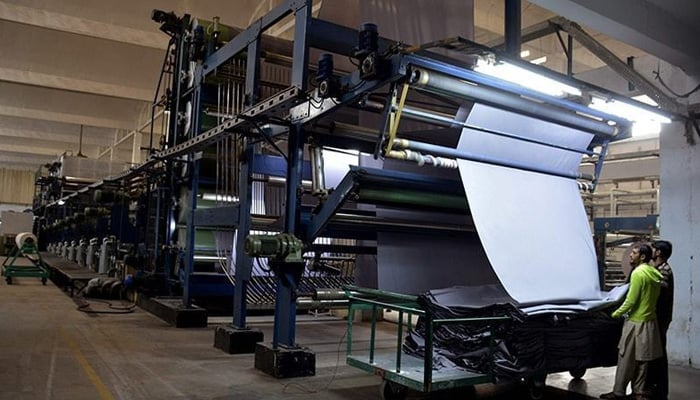Value-added textile sector warns of closure, job losses
KARACHI: Pakistan’s value-added textile sector on Monday expressed fear that more industries would shut down in the coming days in addition to the ones already out of business, increasing the number of layoffs.
Not only textiles, but other exports have declined sharply, with the likelihood of further declines to the lowest ebb amid dangerously low foreign exchange reserves, associations representing the value-added textile sector said at a joint presser.
Participants included Value-Added Textile Forum Coordinator and Pakistan Apparel Forum Chairman Muhammad Jawed Bilwani, Pakistan Hosiery Manufacturers and Exporters Association Chairman Muhammad Babar Khan, PHMA Zonal Chairman Khizer Mehboob,
Pakistan Knitwear and Sweater Exporters Association Chairman Rafiq Godil, Pakistan Cloth Merchants Association former chairman Abdul Samad, and chairman of the Towel Manufacturers Association of Pakistan.
Lamenting the current economic crisis and unresolved problems, they pointed out that industries were compelled to shut down and lay off around 7 million workers, of which 4 million was the textile sector’s workforce.
Raising the matter of letters of credit, the industry representatives said that import of necessary raw materials and accessories with even nominal values such as $5,000 were denied, which dented export orders. This caused severe disruption and delays in completion and even cancellation of export orders.
This situation also led to port demurrage of various consignments, which exceeded the cost of those materials that were damaged and would now be auctioned as they were of no use to export industries.
Recently, textile exporters were also deprived of their remittances to participate in a global textile exhibition scheduled in Germany and barred from sending exhibition materials via an international courier. Participation only became possible after the intervention of the Trade Development Authority of Pakistan, which sought special permission from the State Bank of Pakistan for the purpose.
The value-added sector demanded the government to give it first priority instead of third in imports of raw materials compared to the imports of even essentials like wheat and edible oil and energy.
Lamenting the delay in the release of sales tax refunds, they asked the government to disburse the amount in 72 hours after approval of eRPOs instead of delaying it for two months.
Industrialists have lost faith in the government because of its failure to strengthen the economy. It was impossible to operate under extreme financial stress and an economic crisis. All priority should be given to the value-added textile exporters, the presser participants demanded. The government should allow exporters to spend 20 percent of their foreign remittances on the import of raw material and accessories.
SBP has already allowed exporters to retain 10 percent of their export proceeds in Exporters Special Foreign Currency Account to spend these US dollars on various purpose e.g. foreign consultant payment, hotel booking and travelling, payment for IT equipment and software, lab testing charges, audit/ inspection/ certification charges etc.
Talking about the gas crisis, the industrialists said that amid the gas crisis in the country, particularly in Karachi, they felt deprived of a level playing field and a viable business environment.
-
 Nicole Kidman Celebrates Galentine’s Day Months After Keith Urban Split
Nicole Kidman Celebrates Galentine’s Day Months After Keith Urban Split -
 Justin Bieber Unveils Hailey Bieber As First Face Of SKYLRK In Intimate Campaign Debut
Justin Bieber Unveils Hailey Bieber As First Face Of SKYLRK In Intimate Campaign Debut -
 Caitlin O’Connor Says Fiance Joe Manganiello Has Changed Valentine’s Day For Her
Caitlin O’Connor Says Fiance Joe Manganiello Has Changed Valentine’s Day For Her -
 Rachel Zoe Sends Out Message For Womne With Her Post-divorce Diamond Ring
Rachel Zoe Sends Out Message For Womne With Her Post-divorce Diamond Ring -
 James Van Der Beek's Final Conversation With Director Roger Avary Laid Bare: 'We Cried'
James Van Der Beek's Final Conversation With Director Roger Avary Laid Bare: 'We Cried' -
 Jaden Smith Walks Out Of Interview After Kanye West Question At Film Premiere
Jaden Smith Walks Out Of Interview After Kanye West Question At Film Premiere -
 Why Halle Berry Wasn't Ready For Marriage After Van Hunt Popped Question? Source
Why Halle Berry Wasn't Ready For Marriage After Van Hunt Popped Question? Source -
 Michelle Obama Gets Candid About Spontaneous Decision At Piercings Tattoo
Michelle Obama Gets Candid About Spontaneous Decision At Piercings Tattoo -
 Bunnie Xo Shares Raw Confession After Year-long IVF Struggle
Bunnie Xo Shares Raw Confession After Year-long IVF Struggle -
 Brooks Nader Reveals Why She Quit Fillers After Years
Brooks Nader Reveals Why She Quit Fillers After Years -
 Travis Kelce Plays Key Role In Taylor Swift's 'Opalite' Remix
Travis Kelce Plays Key Role In Taylor Swift's 'Opalite' Remix -
 How Jennifer Aniston's 57th Birthday Went With Boyfriend Jim Curtis
How Jennifer Aniston's 57th Birthday Went With Boyfriend Jim Curtis -
 JoJo Siwa Shares Inspiring Words With Young Changemakers
JoJo Siwa Shares Inspiring Words With Young Changemakers -
 James Van Der Beek Loved Ones Breaks Silence After Fundraiser Hits $2.2M
James Van Der Beek Loved Ones Breaks Silence After Fundraiser Hits $2.2M -
 Disney’s $336m 'Snow White' Remake Ends With $170m Box Office Loss: Report
Disney’s $336m 'Snow White' Remake Ends With $170m Box Office Loss: Report -
 Travis Kelce's Mom Donna Kelce Breaks Silence On His Retirement Plans
Travis Kelce's Mom Donna Kelce Breaks Silence On His Retirement Plans




